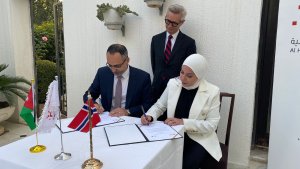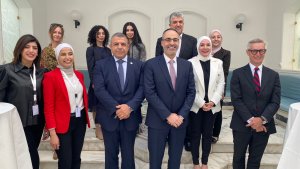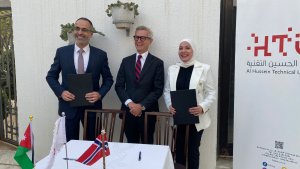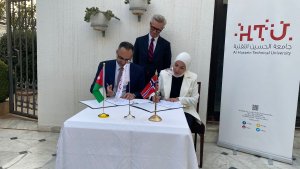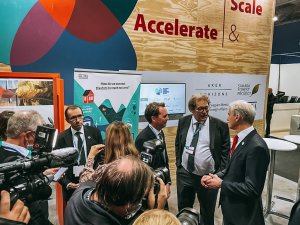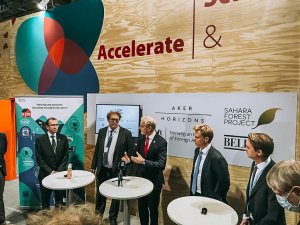PRESS RELEASE
FOR IMMEDIATE RELEASE
Thursday November 18 2021
During an event today in the Norwegian Ambassador residence in Amman, The Sahara Forest Project (SFP) and Al Hussein Technical University (HTU) signed a new collaboration agreement.
The partnership aims to build upon the successful collaboration between SFP and HTU in implementing the pilot phase of the “Upskilling Program in Food Security and Agriculture Technology” that was concluded in October. Both entities renew commitment to work together on anchoring, expanding, and sustaining the program which is the first of its in kind in Jordan.
The Upskilling Program in Food Security and Agricultural Technology aims at developing the skills and competencies of young Jordanian graduates interested in working in innovative and sustainable agri-tech and food production in response to Jordan’s water, energy, and climate action priorities.
Professor Ismail Al Hinti, the President of HTU, highlighted the importance of such cooperation during the signing ceremony. “This partnership with Sahara Forest Project, supported by the Norwegian government, is the momentum that paves the way towards innovation, entrepreneurship, development of agritech, and empowerment of ambitious young females, which are all considered an aim to HTU and a top priority to a country like Jordan,” stated Hinti.
Ruba Al Zubi, SFP representative in Jordan, emphasized that the collaboration with HTU is a source of daily inspiration for everybody involved with the Sahara Forest Project both in Jordan and in Norway. “The transformation of the young ladies on a personal as well as a professional level is heartwarming and promising. The Sahara Forest Project is committed to include this program as one of its strategic pillars for the scale-up phase. We aspire to provide a real model for partnership that combines economic development and social impact”.
The Norwegian Ambassador, Espen Lindbaeck, who visited SFP site in Aqaba along with stakeholders earlier this month hosted the signing ceremony.
“During COP 26 earlier this month, World Leaders emphasized the need to expedite climate action. In that spirit, I am very proud host this event with Al Hussein Technical University and The Sahara Forest Project focusing on education of Jordanian youth, especially women, in sustainable climate-smart agriculture”, Lindbaeck said.
Tayma Ayash, one of the program graduates, praised the training and experience.
“The SFP traineeship was a wonderful experience, it gave us a better understanding of climate-smart agriculture, food security and Agri-tech, and allowed us to grow professionally and put our skills and knowledge into practice. We need this type of program that empowers the female engineers in the MENA region.”
Building on previous successful pilot
In its pilot phase that took place between October 2020 – October 2021, 30 female Engineers were targeted through the partnership between Al Hussein Technical University and the Sahara Forest Project in Aqaba. The program intended to increase employment opportunities for the participants by focusing on the skills required in the labor market, such as specialized technical skills in the areas of climate smart agriculture, English language, research, technical writing, and presentation/communication skills.
Experienced practitioners and specialists designed and delivered the training. Besides, selected female leaders served as Mentors to guide the trainees through their self-development and market entry journey.
The training was two folds; the theoretical aspect which was provided on the campus of HTU in Amman, while the practical aspect was delivered at SFP site in Aqaba through a series of field visits. The initial tracking of the 30 graduates indicates that several of them managed to get into the market as interns or employees for public, private and non-profit organizations. A few of them are pursuing their own community initiatives in the sustainability field.
SFP facility in Aqaba Jordan was inaugurated by HM King Abdullah II and HRH Crown Prince Haakon of Norway in 2017, following 3-year trial period. The project is ready for commercial scale-up for production both for the export of vegetables to Europe and for the domestic vegetable market in Amman to replace the import of vegetables from Europe with vegetables produced at the SFP facility in Aqaba.
